Key takeaways:
- Peer reviews enhance work quality, promote accountability, and foster collaboration and community.
- Constructive dialogue and clear communication are essential for effective peer reviews, helping to refine ideas and provide valuable insights.
- Conflicting feedback and emotional investment can be challenges in peer reviews, but embracing critiques leads to growth and innovation.
- Establishing a respectful relationship between reviewers and authors enhances the review process, making feedback more effective and impactful.
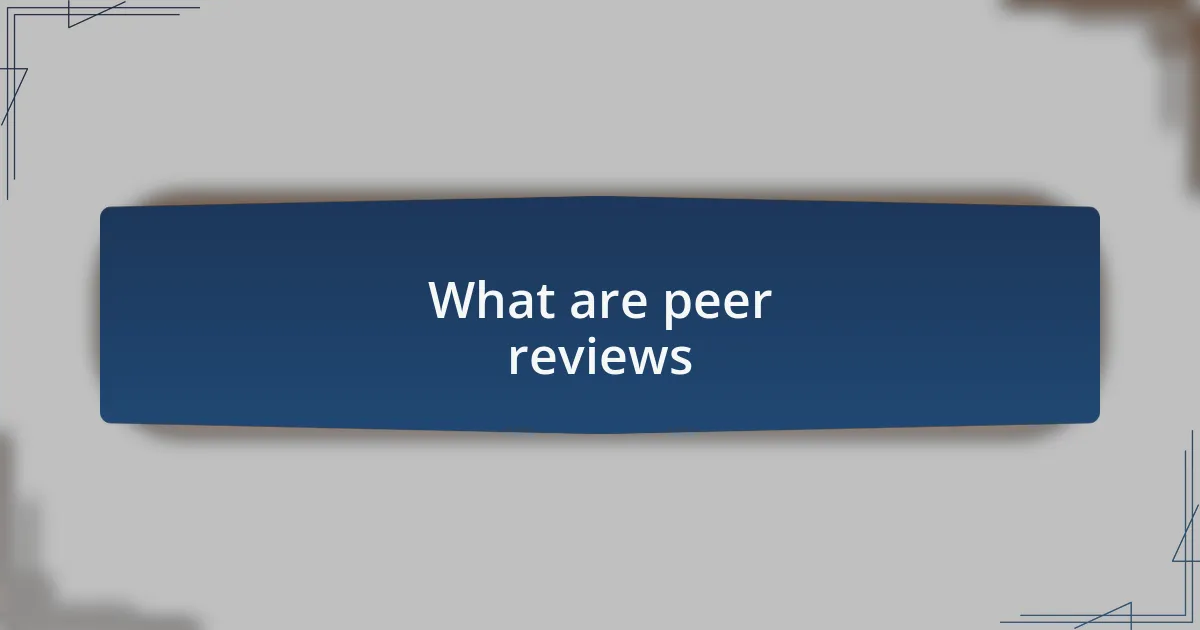
What are peer reviews
Peer reviews are evaluations of work by one or more experts in the same field. When I first encountered this concept during my academic journey, I was both intrigued and intimidated. It made me wonder: how can feedback from peers elevate the quality of our work?
In my experience, peer reviews serve as a vital tool for quality assurance. I remember submitting my first article and receiving thoughtful critiques that forced me to see my writing from different perspectives. This process not only improved my article but also deepened my understanding of the subject matter.
These reviews foster collaboration and learning. Have you ever received feedback that changed your viewpoint? For me, it was enlightening to realize that others might catch things I overlook, highlighting the importance of collective insight in refining our ideas and contributions.
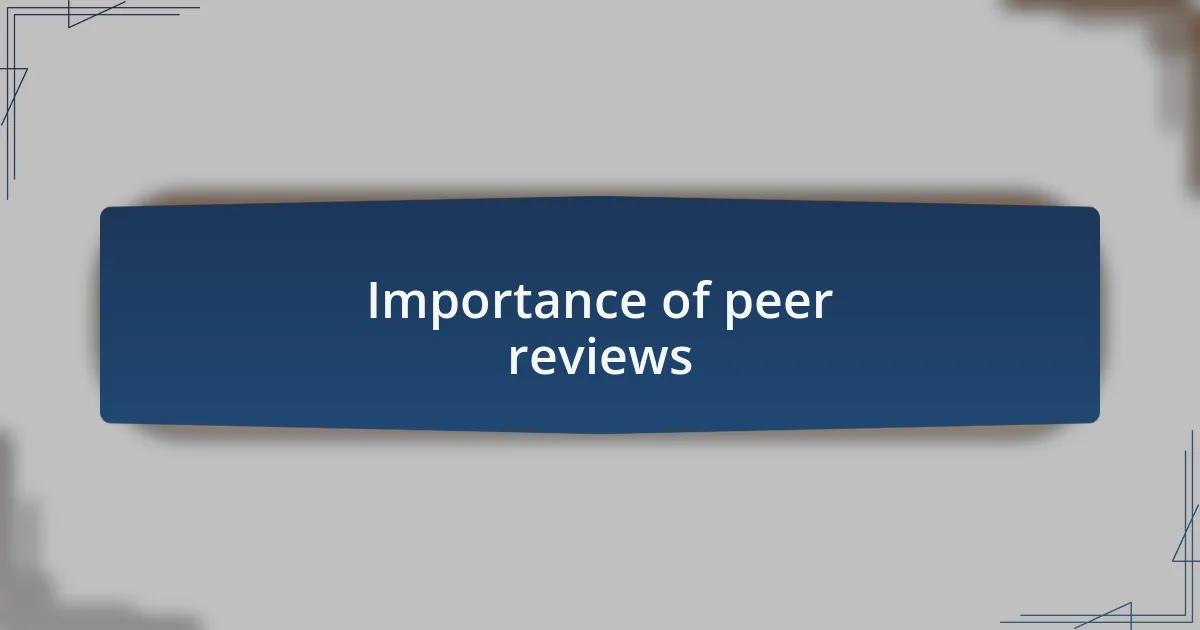
Importance of peer reviews
Receiving peer reviews is critical because they not only enhance the quality of your work but also promote accountability. I recall a particularly challenging project where feedback from colleagues prompted me to rethink my approach entirely. Their insights transformed my work, showing me that collaboration often leads to unexpected and valuable outcomes.
I often reflect on how peer reviews can illuminate blind spots in our understanding. One time, I received comments on a piece I thought was solid, yet my peers pointed out nuances I had missed. This experience reinforced the idea that we’re all constantly growing and learning, and a fresh perspective can be the catalyst for that growth.
Moreover, peer reviews foster a sense of community and shared purpose. When others invest their time in reviewing my work, it feels like a vote of confidence. Have you ever felt supported by your peers in this way? It’s in those moments that I realize how essential it is to surround ourselves with people who challenge us and uplift our ideas, ultimately driving progress and innovation.
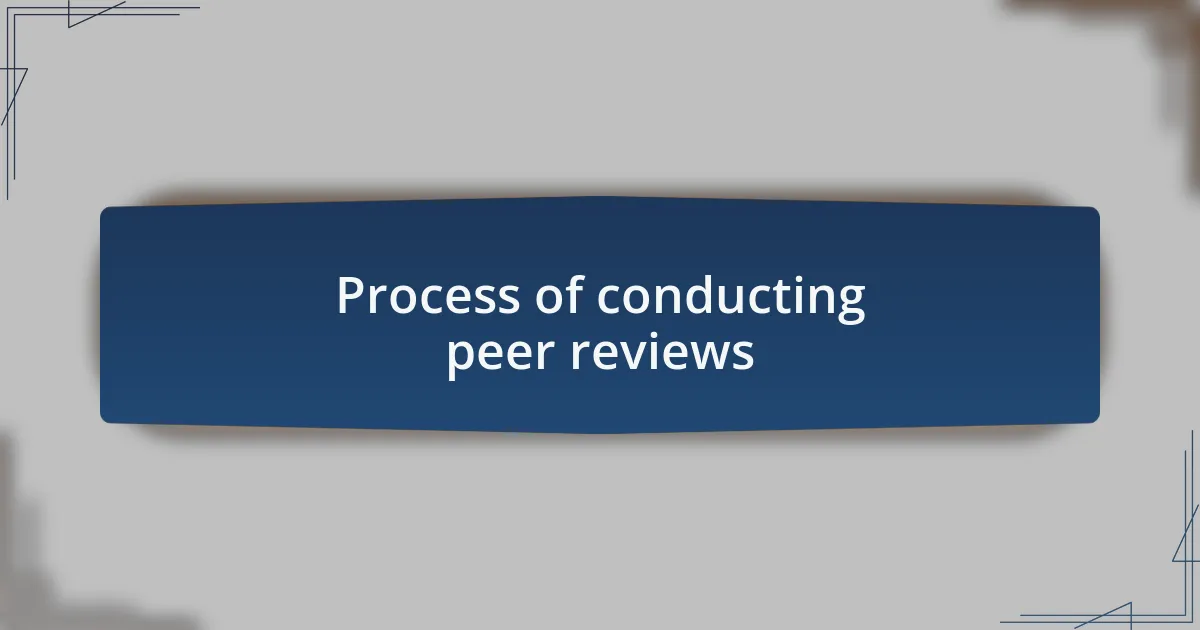
Process of conducting peer reviews
When conducting peer reviews, the first step typically involves selecting the right peers who possess relevant expertise or experience. I remember choosing colleagues for a review on a web application I had developed; their backgrounds in user experience were invaluable. The right reviewers can bring a depth of understanding that makes all the difference in the outcome.
Once the reviewers are selected, the next stage is to share your work along with specific guidelines for feedback. I’ve found that clear expectations help peer reviewers focus on the most crucial aspects of the project. For instance, when I provided them with targeted questions about usability and performance, I received thoughtful responses that directed my revisions and led to significant improvements.
After feedback is gathered, it’s essential to engage in a constructive dialogue. I once had a reviewer challenge some of my assumptions, which made me rethink my approach entirely. This process isn’t just about accepting or rejecting feedback; it’s about collaboratively refining ideas and discovering new possibilities. Can you imagine how much innovation can sprout from such discussions? It truly reminded me that the essence of peer reviews lies in mutual growth and exploration.
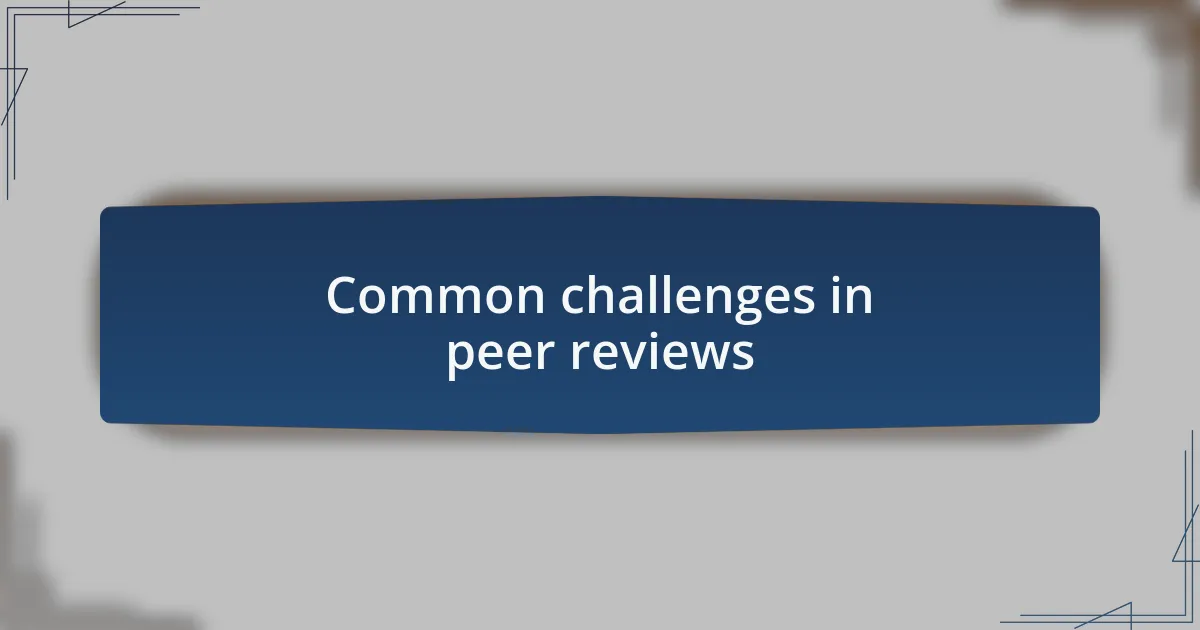
Common challenges in peer reviews
One common challenge I’ve encountered in peer reviews is navigating differing opinions. When several peers provide conflicting feedback, it can feel overwhelming. I remember a session where one reviewer praised my approach while another found it flawed. It’s like standing at a crossroads, unsure of which path to take. How do you decide whose perspective to prioritize?
Another hurdle can be the emotional investment in one’s work. I once shared a project I was particularly passionate about, only to face critical feedback. Initially, it felt personal—like a rejection of my ideas. But with time, I realized that constructive criticism is meant to enhance my work. Have you ever felt that sting of critique transform into motivation?
Additionally, time constraints often hinder thorough evaluations. There have been instances where I wished for more time to digest feedback fully, feeling rushed to implement changes. It’s tough to balance promptness and depth in reviews. How can we ensure that quality feedback doesn’t fall victim to the ticking clock?
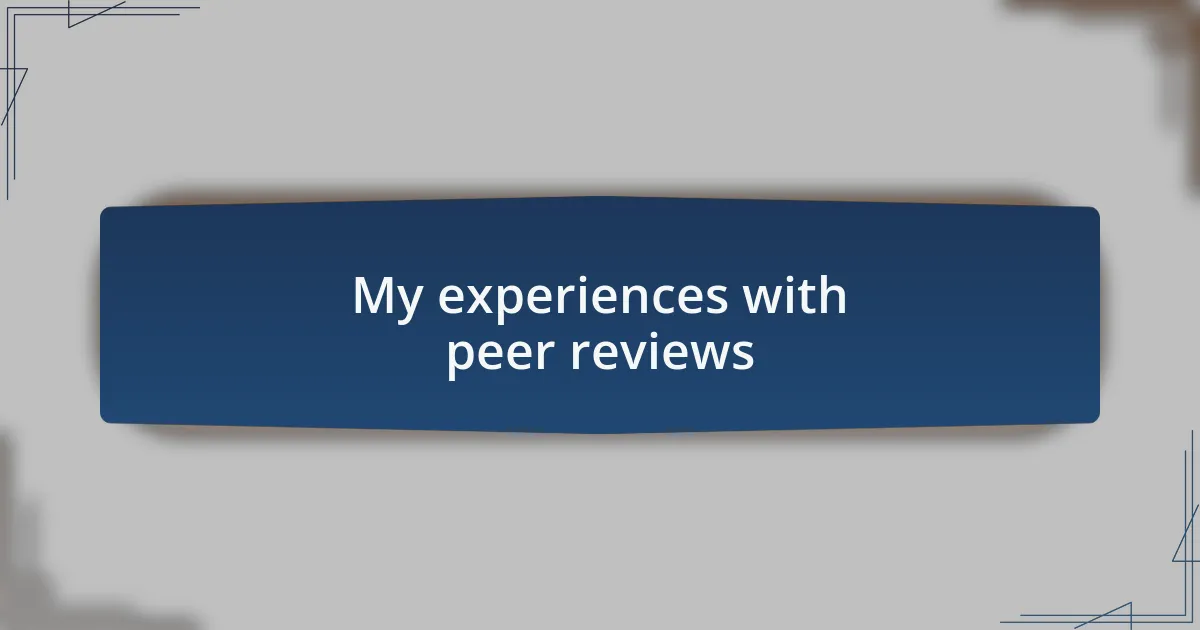
My experiences with peer reviews
Reflecting on my experiences with peer reviews, I’ve learned that they often feel like a tightrope walk. During my first peer review session, I was both excited and anxious, as if I were about to share a secret. When I received feedback, some of it felt like a punch to the gut, especially the comments that pointed out my oversights. How do you keep your composure when feedback feels tough to swallow?
I’ve also discovered the value of constructive dialogue. One time, a colleague provided feedback so engagingly that it sparked a deep discussion. We bounced ideas off each other, and the back-and-forth made the review process feel collaborative rather than combative. Isn’t it amazing how sometimes, a single conversation can shift your entire perspective on a project?
Ultimately, I find that embracing peer reviews can be a pathway to growth. I distinctly remember revisiting a project after receiving critical feedback and realizing how much stronger it became. When I took the time to integrate those suggestions, my work improved immensely. Have you ever experienced a similar transformation through feedback?
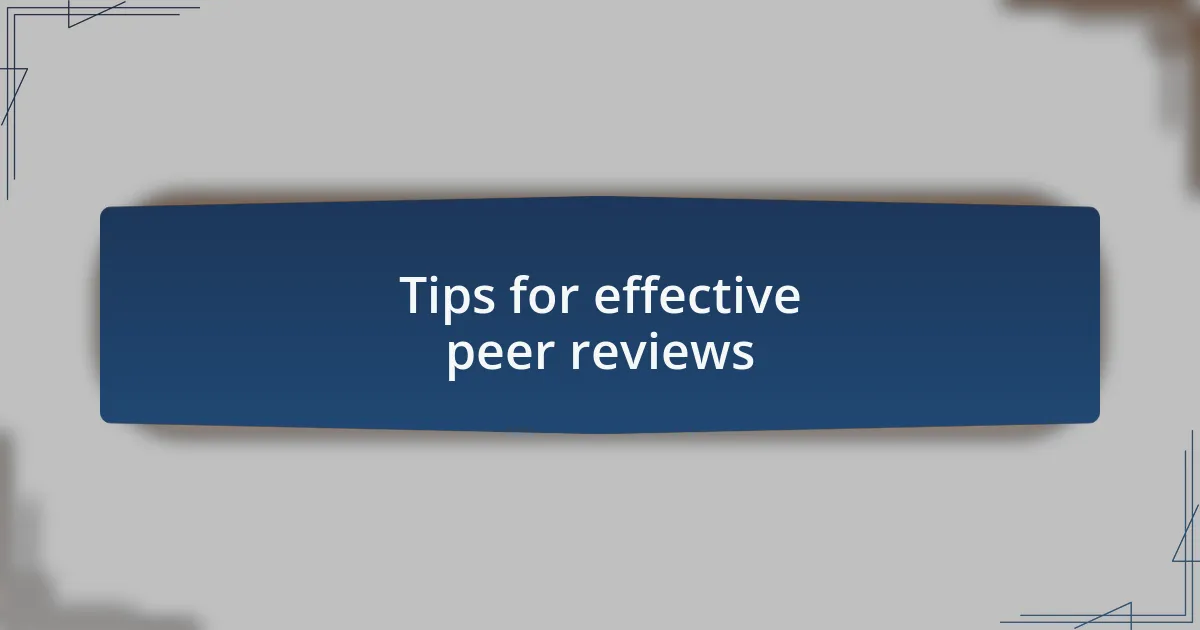
Tips for effective peer reviews
When it comes to effective peer reviews, clear communication is key. I remember a time when I was unclear about the goals of my project, and the feedback I received mirrored that confusion. I learned that providing context—like outlining what I wanted to achieve—can lead to more targeted and helpful insights. Have you ever considered how much clarity can change the kind of feedback you receive?
Another critical tip is to approach the review with an open mind. I recall a situation when one of my peers offered suggestions that seemed contrary to my vision. Initially defensive, I took a step back and realized their perspective helped broaden my understanding of the project’s potential audience. What if we approached feedback not just as criticism but as a chance to explore new ideas?
Finally, it’s important to give feedback that balances critiques with positive reinforcement. I once received a review filled with harsh criticisms but lacking appreciation for what I did well. As a result, I dangled between confusion and demotivation. From that experience, I decided to always include a “compliments sandwich” in my feedback—starting with something positive, discussing areas for improvement, and finishing on an encouraging note. How do you think this technique could impact the way feedback is received?
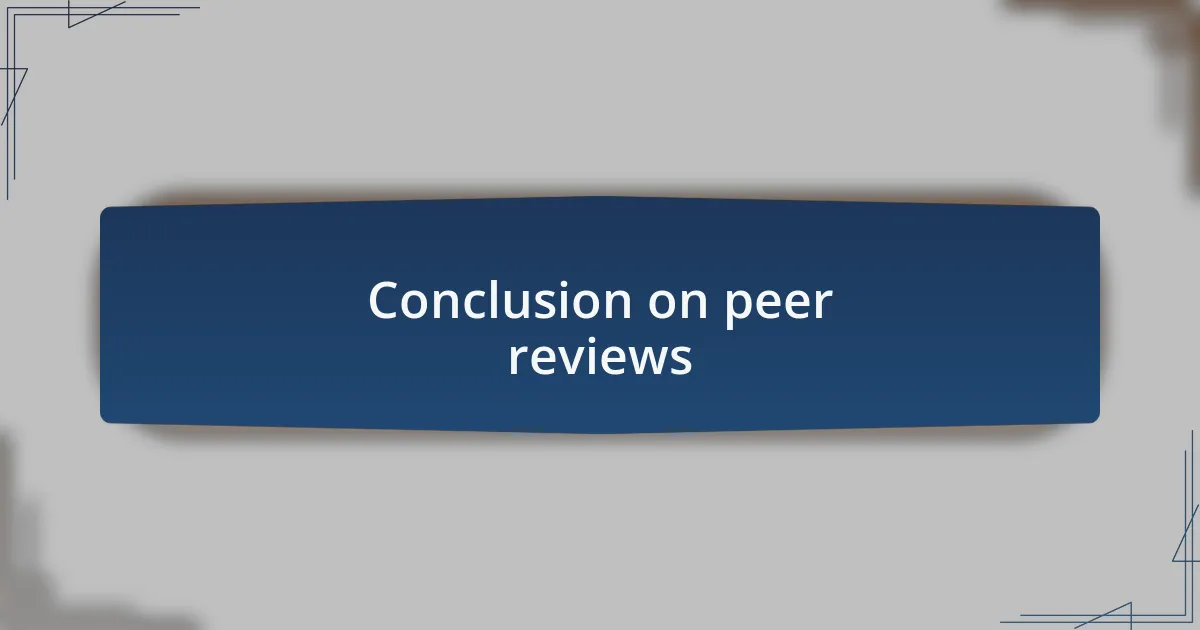
Conclusion on peer reviews
Peer reviews, when approached thoughtfully, can be a transformative process. I remember a time when a peer’s feedback opened my eyes to aspects of my work I hadn’t considered—like revisiting a design choice I thought was perfect. This experience reaffirmed my belief that constructive criticism isn’t just about pointing out flaws but nurturing ideas that can lead to growth. Isn’t it fascinating how another set of eyes can spark new creativity?
The effectiveness of peer reviews often hinges on the relationship between reviewers and authors. In one instance, I received feedback from a colleague I respected deeply; their words carried weight, and I was more receptive to their suggestions. I think that mutual respect elevates the entire process—because it transforms what could be mere criticism into a valuable dialogue. How often do we consider the importance of who delivers the feedback?
In conclusion, embracing the full spectrum of peer reviews requires vulnerability and willingness to learn. There have been moments when I felt exposed after sharing my work, yet those experiences ultimately resulted in deeper connections and improved outcomes. So, how can we cultivate an environment where peer reviews thrive? By fostering open communication and valuing diverse perspectives, we can truly unlock the potential of collective wisdom in our work.